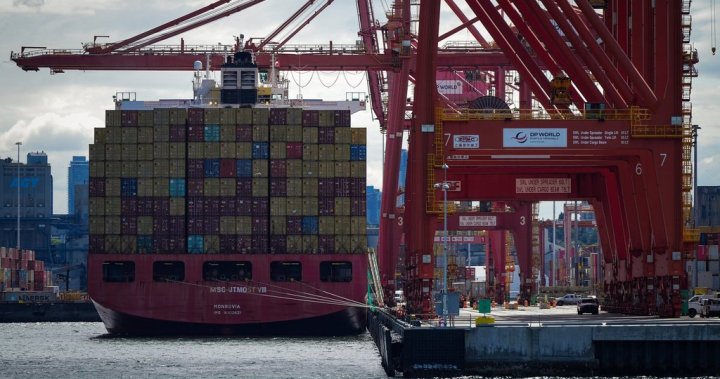Descrease article font size
Increase article font size
The Port of Vancouver moved a record amount of goods through its gates last year, an increase fuelled largely by surging oil exports enabled by the Trans Mountain pipeline expansion.

Total freight at the country’s biggest port grew five per cent year-over-year to reach 158 million tonnes in 2024, the Vancouver Fraser Port Authority said Monday.
Crude oil exports climbed 527 per cent thanks to the Trans Mountain pipeline expansion that began operations last spring.
The project twinned the existing pipeline and nearly tripled its capacity at a total cost of $34 billion. The pipeline extends from a storage terminal in Edmonton to the Rockies before winding southwest to a terminal in Burnaby, B.C.
“Trans Mountain’s expansion coming into operation last May was a significant milestone for Canada and the port, adding export capacity and opening up new opportunities for Canadian producers,” said port authority CEO Peter Xotta in a release.

0:32
Trans Mountain startup will boost Canadian oil production to all-time high: Deloitte
Container traffic recovered in 2024, rising 11 per cent from 2023 in a return to pre-pandemic levels. The boost came on the heels of a post-COVID dip, which in turn followed a spike driven by demand for consumer items at the height of the pandemic. Household goods and construction materials led the resurgence of products imported via steel box.
Trending Now

Snowbirds, take note: The U.S. says these foreign nationals must register

B.C. removes all U.S. liquor from store shelves: Trump can ‘keep his watery beer’

Get the day’s top news, political, economic, and current affairs headlines, delivered to your inbox once a day.
Several hurdles hampered port activity last year. Among them were extreme weather — wildfires and low temperatures halted freight trains at various points — and work stoppages at B.C. ports and both major railways.
Nearly 470,000 vehicle imports — another record — rolled onto the docks last year in a three per cent increase driven by Canadians’ appetite for new cars, the port authority said.
Canola shipments increased 23 per cent, but wheat volumes — by far the biggest grain category — fell 10 per cent year-over-year.
Log exports dropped 38 per cent and mineral shipments 21 per cent. Coal exports dipped two per cent in 2024.
However, another type of traffic hit a new high-water mark. Cruise ship passenger volumes swelled to a record 1.33 million, jumping seven per cent from the 1.24 million cruisers who made landfall in Vancouver Harbour in 2023, most of them en route to or from Alaska.
More on Money
More videos
© 2025 The Canadian Press
